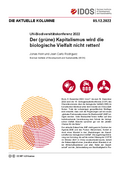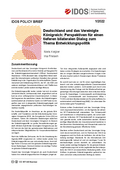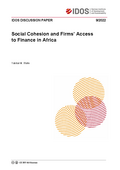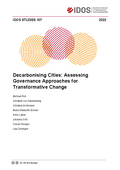-

Publikationen
Photo: www.shutterstock.com/de/image-photo/pont-du-gard-old-roman-aqueduct-45688924
Publikationen
Das German Institute of Development and Sustainability (IDOS) gibt vier eigenständige Publikationsreihen heraus. In Discussion Papers, Policy Briefs und Studies veröffentlichen die Wissenschaftler*innen des IDOS ihre aktuellen Forschungsergebnisse. Auch Gastwissenschaftler*innen und Kooperationspartner haben die Möglichkeit, ihre Forschungsergebnisse in einer der IDOS-Reihen zu publizieren. Publikationen der 2022 eingestellten Reihen Analysen und Stellungnahmen, Briefing Paper sowie Two-Pager / Zweiseiter sind weiterhin online verfügbar. Die vierte Publikationsreihe ist für Meinungsbeiträge vorgesehen: Regelmäßig kommentiert die Aktuelle Kolumne die neuesten Entwicklungen und Themen der internationalen Entwicklungspolitik.
Wissenschaftler*innen des IDOS veröffentlichen ihre Forschungsergebnisse zudem regelmäßig in referierten und nicht referierten deutschen und internationalen Fachzeitschriften und Publikationsreihen anderer Forschungseinrichtungen und Institutionen sowie bei renommierten Buchverlagen. Zusätzlich nutzen sie Blogs und Online-Plattformen der Partnerinstitutionen, um die Forschungs- und Beratungstätigkeit des Instituts einer interessierten Öffentlichkeit zu vermitteln.
Es wurden 9409 Ergebnisse gefunden. Zeige Ergebnisse 1861 bis 1870 von 9409.
-
Trends in African Migration to Europe: Drivers Beyond Economic Motivations
-
Club governance and legitimacy: the perspective of old and rising powers on the G7 and the G20
-
Environmental provisions in trade agreements: defending regulatory space or pursuing offensive interests?
-
Global imbalances: a job for the G20?
-
Not in my backyard? Welfare gains and social challenges: the impact of refugees on the host population in Uganda
-
Do no harm? Field research in the Global South: ethical challenges faced by research staff
-
Poverty alleviation and local environmental degradation: an empirical analysis in Colombia
-
The future of European development finance – institutional reforms for sustainable solutions
-
The development policy system: where do we stand? Where do we go? 发展政策体系:我们站在哪里?我们走向何方?
-
Reflecting on the right to development from the perspective of global environmental change and the 2030 Agenda for Sustainable Development















